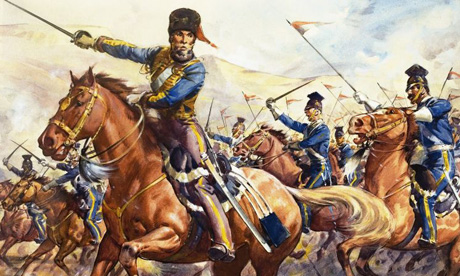
The Democrats’ “shellacking” at the hands of the Republicans last week (the description is President Obama’s) has me thinking about Alfred, Lord Tennyson’s Charge of the Light Brigade. But perhaps not in the way that you think.
Tennyson’s memorable poem commemorated the insane charge by the British cavalry against Russian machine guns at Balaclava in 1854 during the Crimean War. The British lost 118 men killed, 127 wounded and about 60 prisoners taken. “It’s magnificent but it’s not war,” one French commander memorably said. (“C’est magnifique mais ce n’est pas la guerre.”) Commanding officers argued bitterly for decades afterwards about who was responsible.
Now there are people accusing Obama and Pelosi of having orchestrated their own mad charge. If only their crazy idealism had not prevailed with regard to universal health care, one narrative has it, they wouldn’t have led their troops into the slaughter. To use Tennyson’s verb, they are seen to have “blundered.” One could even say that they had “cannons to the left of them” (those single-payer advocates who didn’t think the plan went far enough) as well as to the right. At any rate, the second guessing has now officially begun.
For instance, Washington Post political junkie Dana Milbank believes that Obama should have been Hillary-Clinton cautious about changes to health care, making only modest changes. (He appears to think that Hillary would have made a better president.) Retired Indiana Senator Even Bayh argues that the Democrats should have focused on the economy rather than the “noble aspiration” of health care.
In terms of the poem, I guess this turns the Democrats who passed the legislation into ours-not-to-reason-why followers who blindly trusted their leaders and got killed for their pains.
Before I discuss this further, here’s the poem:
Half a league, half a league,
Half a league onward,
All in the valley of Death
Rode the six hundred.
“Forward, the Light Brigade!
“Charge for the guns!” he said:
Into the valley of Death
Rode the six hundred.
“Forward, the Light Brigade!”
Was there a man dismay’d?
Not tho’ the soldier knew
Someone had blunder’d:
Theirs not to make reply,
Theirs not to reason why,
Theirs but to do and die:
Into the valley of Death
Rode the six hundred.
Cannon to right of them,
Cannon to left of them,
Cannon in front of them
Volley’d and thunder’d;
Storm’d at with shot and shell,
Boldly they rode and well,
Into the jaws of Death,
Into the mouth of Hell
Rode the six hundred.
Flash’d all their sabres bare,
Flash’d as they turn’d in air,
Sabring the gunners there,
Charging an army, while
All the world wonder’d:
Plunged in the battery-smoke
Right thro’ the line they broke;
Cossack and Russian
Reel’d from the sabre stroke
Shatter’d and sunder’d.
Then they rode back, but not
Not the six hundred.
Cannon to right of them,
Cannon to left of them,
Cannon behind them
Volley’d and thunder’d;
Storm’d at with shot and shell,
While horse and hero fell,
They that had fought so well
Came thro’ the jaws of Death
Back from the mouth of Hell,
All that was left of them,
Left of six hundred.
When can their glory fade?
O the wild charge they made!
All the world wondered.
Honor the charge they made,
Honor the Light Brigade,
Noble six hundred.
Tragic though the circumstances were, there’s another side to them as well. The charge was so memorable that it actually gave the British a psychological advantage for the rest of the war (which, incidentally, they won). Maybe the Democrats’ own suicidal charge (if that’s what it was) means that they win the war.
This is the case made by William Saletan in a Slate article with the eye-catching title of “Pelosi’s Triumph: Democrats didn’t lose the battle of 2010. They won it.” Saletan doesn’t think that the health care plan sunk the Democrats but adds that, even if it did, it still wasn’t a mistake. Here’s his argument:
I’m not buying the autopsy or the obituary. In the national exit poll, voters were split on health care. Unemployment is at nearly 10 percent. Democrats lost a lot of seats that were never really theirs, and those who voted against the bill lost at a higher rate than did those who voted for it. But if health care did cost the party its majority, so what? The bill was more important than the election.
I realize that sounds crazy. We’ve become so obsessed with who wins or loses in politics that we’ve forgotten what the winning and losing are about. Partisans fixate on punishing their enemies in the next campaign. Reporters, in the name of objectivity, refuse to judge anything but the Election Day score card. Politicians rationalize their self-preservation by imagining themselves as dynasty builders. They think this is the big picture.
They’re wrong. The big picture isn’t about winning or keeping power. It’s about using it.
So from Saletan’s point of view, all the world should wonder in awe that these brave souls made a courageous and principled charge, even though (or rather, especially because) it ended in their electoral defeats. From his perspective, we may be honoring their glory fifty years from now, the way we honor FDR for Social Security and Lyndon Johnson for Medicare.
In fact, maybe we’ll honor this Congress even more because, unlike those previous Congresses, many members died in the charge (if their health care votes were indeed the reason they were defeated). Certainly, given the intense pressures of the issue, they voted while being “storm’d at with shot and shell.” Whether brave or rash, they rode into the mouth of hell and emerged with something big.

